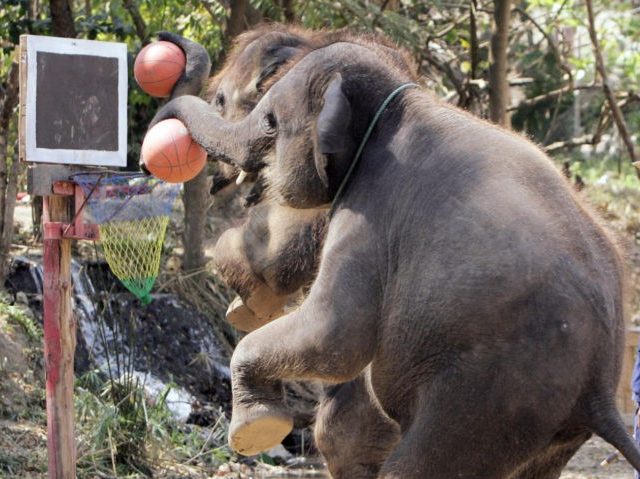The firestorm that followed the National Basketball Association’s (NBA) kowtowing to China reflects the souring of China’s relationship with the U.S. However, it may not fundamentally change the way U.S. businesses respond to pressure from the Chinese regime.
The reason is simple: offending China’s regime can have serious business consequences. There is little risk to sales or profits from offending U.S. leaders or the American people by kowtowing to Chinese pressure.
“The price you pay for backing down to China is a week of Twitter opprobrium,” Jude Blanchette, the CSIS Freeman Chair in China Studies said in an interview on CNBC Tuesday. “Whereas the price you pay in China is the loss of market access.”
The NBA furor began when Houston Rockets general manager Daryl Morey tweeted his support for Hong Kong’s protesters.
That’s hardly a controversial position in the U.S., where there is widespread sympathy for the protesters who often wave U.S. flags and say they are inspired by America’s tradition of liberty, but it is beyond the pale for China’s leaders. Although Twitter is blocked in China, Morey’s message — and the Chinese regime’s disapproval — was echoed through official and unofficial channels over the weekend. The tweet was swiftly deleted, and the NBA expressed sorrow for the offending words.
That is now a familiar pattern. Companies as diverse as Marriot, Delta, United, Apple, Coach, Tiffany, Vans, and Activision/Blizzard have all apologized or changed politics or products when confronted by China. Hollywood explicitly caters its films to the Chinese markets, careful not to offend the sensibilities of China’s nationalists and ruling elite. Often outspoken leaders of big American banks, like J.P. Morgan Chase’s Jamie Dimon or former Goldman Sachs chief Lloyd Blankfein, fall silent when it comes to China’s human rights abuses, growing totalitarianism, and even trade abuses.
It’s easy to see why the NBA does not want to get shut out of China. Last year, 490 million people watched online NBA broadcasts in China, the Wall Street Journal reported. And with 1.4 billion people, China is perhaps the biggest potential growth market for the league.
That too is familiar. U.S. companies have long viewed China’s enormous population, growing economy, and rising middle class as an irresistible opportunity. Even when they are forced to surrender half of their profits to free-riding Chinese “partners,” few have been willing to forego the lure of access to China’s consumers.
That has largely been a reflection of U.S. policy toward China. The U.S. has encouraged further entanglement with China. One administration after the other, Democrat and Republican, encouraged further economic engagement and discouraged conflict. Even as the costs to the U.S. in terms of lost jobs were far worse than expected and the benefits of what was once viewed as the inevitable Chinese liberalization proved illusory, the policy was largely unwavering. This both served the interests of corporate America, at least in the short-term, and conditioned corporate America to accept China’s demands upon them.
The corner offices in America’s corporate headquarters are now populated by executives who rose through this systemic bias in favor of China engagement. Companies and executives who might have resisted China’s increasingly stringent policing of criticism from around the globe were shunted aside. Betting on China was just how you won in corporate America for the last few decades.
Now that might be changing. President Donald Trump has taken aim at China’s trade practices and economic predation with his tariffs. Capitol Hill lawmakers such as Marco Rubio have challenged China’s plans for dominance in technology. Democratic hopeful Elizabeth Warren has been severely critical of China on human rights and workers’ rights.
The backlash against the NBA’s kowtow illustrates this. It has come from all over the political spectrum.
Wall Street Journal columnist Michael Bird is hopeful this could prompt a change in corporate America:
But firms will need to be more careful in the future. The NBA is discovering that groveling to Beijing is no longer a one-way street, as American politicians weighed in supporting Mr. Morey. The company’s strong brand in the U.S. could be tarnished if its executives are seen to be in the pocket of an autocratic government. Broad bipartisan support for Hong Kong protesters places businesses in political crosshairs they’d rather avoid.
And yet it might not amount to much — at least not without a policy follow-up.
As Blanchette points out, China still has the ability to punish U.S. companies that do no suppress speech critical of China. While the cost of kowtowing is simply a public relations embarrassment that is likely to pass. No one thinks Americans will quit watching professional basketball because the league was too cozy with China’s leadership.
In fact, even as the backlash mounted in the U.S., China kept up the pressure. State broadcaster China Central Television (CCTV) on Tuesday issued a statement on the social media platform Weibo noting its “strong dissatisfaction and opposition” to comments made by the NBA commissioner Adam Silver, who had held a press conference in which he walked back the league’s kowtow and defended Morey’s freedom to express his opinion.
“We believe that any speech challenging a country’s national sovereignty and social stability is not within the scope of freedom of speech,” CCTV said.
China has a policy of defending its reputation against criticism that can hurt the profits of U.S. businesses that defy it. The U.S. has politicians saying critical things — a kind of virtue signaling — on Twitter.
Care to guess which is more effective?

COMMENTS
Please let us know if you're having issues with commenting.